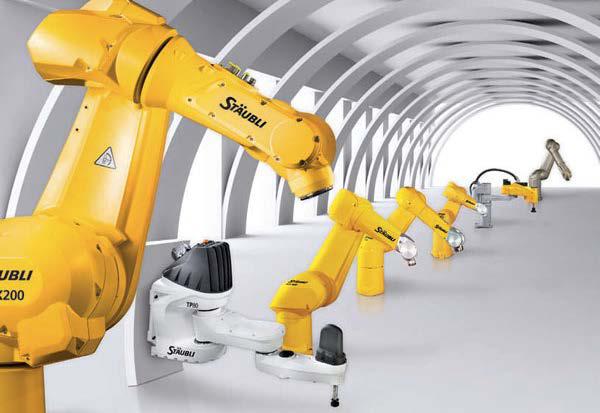कोशिश गोल्ड - मुक्त
Textile Automation Impact
Textile Value Chain
|October 2025
We explore how automation is redefining the textile and apparel industries not just in technology, but in the very foundation of production, sustainability, and competitiveness.

From smart spinning systems to AI-driven quality monitoring, automation is no longer a distant concept; it’s a daily reality shaping every step of the manufacturing process. Spinning, weaving, dyeing, and garment production are becoming more precise, efficient, and resource-conscious through digital control and intelligent systems.
At the same time, this transformation raises important questions about labour dynamics, skill development, and social impact. The textile workforce must evolve from manual operation to machine supervision, data analysis, and process optimisation.
Automation is also becoming a cornerstone of sustainability, helping mills reduce waste, energy consumption, and chemical usage — key factors for global competitiveness in an environmentally conscious market.
As we look forward, one thing is certain: Textile automation is not replacing people but reducing manpower— it’s redefining roles, efficiency, and the path to a smarter, sustainable future How Automation Is Transforming Textile Manufacturing Automation today is no longer only the mechanisation of single tasks — it’s the integration of robotics, sensors/IoT, AI and digital workflows across the full value chain (spinning weaving/knitting dyeing/ finishing cutting & sewing intralogistics). That changes factories from labour-intensive workshops into connected, data-driven production systems that can run continuously, trace quality in real time, and shift faster between SKUs.
Automation in the manufacturing process helps material handling, process control by DIGITAL TRANSFORMATION, easy to packing, easy to raw material and finished goods transportation.
Practical effects: • More end-to-end flow automation (automated material handling, automated cutting, robotic sewing prototypes).
यह कहानी Textile Value Chain के October 2025 संस्करण से ली गई है।
हजारों चुनिंदा प्रीमियम कहानियों और 10,000 से अधिक पत्रिकाओं और समाचार पत्रों तक पहुंचने के लिए मैगज़्टर गोल्ड की सदस्यता लें।
क्या आप पहले से ही ग्राहक हैं? साइन इन करें
Textile Value Chain से और कहानियाँ

Textile Value Chain
TMMA's 65th Annual General Meeting: Charting the Future of India's Textile Machinery Sector
The Textile Machinery Manufacturers' Association (India) successfully organised its 65th Annual General Meeting (AGM), Export and R&D Awards Function, and a high-level stakeholder consultation at the India ITME Centre, Mumbai. The event brought together industry leaders, policymakers, and innovators to reflect on the current state of the textile machinery sector and chart the path forward.
6 mins
October 2025

Textile Value Chain
Textile Circularity - A Decade of Experiments and Experiences at Meemansa
The textile industry is a paradox: it is a generator of beauty, culture, and livelihoods - yet also one of the most resource-intensive and waste-producing sectors in the world.
6 mins
October 2025

Textile Value Chain
Your Next Big Buyer Won't Ask for Price - They'll Ask for Your Scope 3
Every time we make a piece of clothing — from buying cotton to spinning yarn, weaving fabric, stitching garments, transporting, and even the way the customer washes it — we leave behind a footprint.
3 mins
October 2025

Textile Value Chain
Textile Automation Impact
We explore how automation is redefining the textile and apparel industries not just in technology, but in the very foundation of production, sustainability, and competitiveness.
4 mins
October 2025

Textile Value Chain
India Gets its First: Liva Reviva TM M Marks a New Milestone in Recycled Cellulosic Fibre
Redefining fashion's environmental future, Birla Cellulose has introduced Liva Reviva™ M: India's first next-generation circular fibre.
1 mins
October 2025

Textile Value Chain
NIT Jalandhar Signs MoU with Tynor Orthotics, Mohali
The Department of Textile Technology at Dr B. R. Ambedkar National Institute of Technology (NIT), Jalandhar, has signed a Memorandum of Understanding (MoU) with Tynor Orthotics Pvt. Ltd., a leading Indian manufacturer of orthopaedic and healthcare products.
1 min
October 2025

Textile Value Chain
It's the Machine Era...Upgrade to Safeguard & Magnify Textiles!!!
Our world is surrounded by automated systems; we wake up to the chirping sounds of alarms, and with another touch, the coffee maker starts brewing.
7 mins
October 2025

Textile Value Chain
Recycled Polyester Fabric: From Plastic Bottles to Your Wardrobe
Every day, millions of plastic bottles end up in trash bins around the world.
4 mins
October 2025

Textile Value Chain
Geopolitical Risks and the Future of Indian Textile Exports: Navigating an Uncertain World
The global textile trade, once anchored in predictable economic cycles and established trade corridors, now finds itself navigating one of the most volatile geopolitical landscapes in decades. From the Russia x Ukraine war to the conflict in West Asia, from U.S. x China, U.S. x India tariff hostilities to fragmented global trade alliances, uncertainty has become the new constant.
4 mins
October 2025

Textile Value Chain
The Impact of Textile Automation: Transforming an Industry Thread by Thread
Walk into any modern textile factory today, and you'll witness something remarkable. Machines that once needed constant human guidance now hum along independently, making split-second decisions. Robots handle delicate fabrics with precision that would make veteran seamstresses nod in approval. This isn't science fiction; it's the reality reshaping the $31 billion textile machinery market right now.
6 mins
October 2025
Listen
Translate
Change font size
